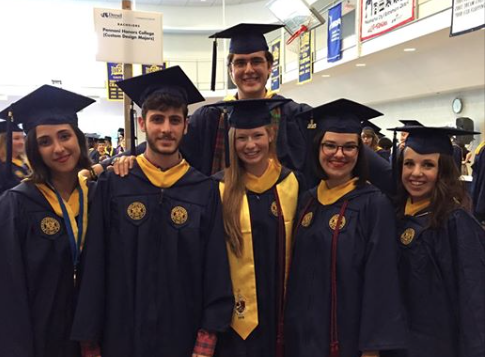Commission for Academic Support in Higher Education
Monday, 8 August 2016 - 5:22pm

Mission Statement
The mission of the Custom-Designed Major is to empower highly motivated undergraduate students to pursue a unique self-directed and interdisciplinary education.
Overview
The Custom-Designed Major enables students to pursue a Bachelor of Science degree with an individualized course of study not readily available through an existing major, or a combination of existing majors and/or minors offered at Drexel University. The program is designed for highly motivated students, whose interdisciplinary curiosity and career ambitions cannot be satisfied by a traditional, preexisting major. It is open to incoming undergraduate first year students and students transferring from other majors within the university. The program provides the opportunity for an early intensive research experience; incorporates cooperative education as part of its degree requirements; and culminates in an original, interdisciplinary senior-year project. While the major is administratively housed in the Pennoni Honors College, we do not require
Honors Program membership in order to be considered. GPA is certainly a factor in the selection process, however we believe that students that may not initially thrive in the traditional classroom sense may well succeed academically after discovering a path of study they feel passionately about.
Prospective students undergo a rigorous application process involving intensive review of the following materials by program staff and a faculty committee:
- A Vision Statement that outlines the student’s goals and explains how the disciplines they hope to pull from come together to form a cohesive and purpose-driven curriculum. Applicants must also defend their proposed path of study by discussing why their goals could not be met within a more traditional path or combination thereof.
- A Term-by-Term Plan of Study that outlines all future coursework.
- Two letters of support, one from a faculty member discussing the applicant’s scholarly potential and another from an individual, such as a mentor or supervisor, that is able to speak to characteristics such as creativity, resiliency, leadership, and drive, among other traits.
Student Learning Goals
Upon degree completion, graduates of the Custom Designed Major program will be able to...
- Demonstrate the ability to think and make connections across disciplinary fields of knowledge
- Demonstrate the ability to apply cross-disciplinary methodologies to research
- Demonstrate applied interdisciplinary problem-solving skills to complex problems
- Demonstrate an understanding of content and methodology of at least three substantive fields of knowledge chosen by the student
- Demonstrate self-directed learning through the development and achievement of a set of learning goals which are appropriate to their self-designed course of study and which were crafted in consultation with CSDN faculty (including faculty mentor) and professional staff
- Demonstrate effective written and oral communication skills
- Demonstrate the capacity for self-advocacy
- Demonstrate the requisite skills to develop and execute a long-term project that incorporates the knowledge, methodologies, and design techniques of the fields from which the students draws
Advising Philosophy and Advice for Other Academic Support Colleagues
The mantra by which we guide our advising comes from Marc Lowenstein’s quote about advising as teaching: “An excellent advisor does the same for the student’s entire curriculum that the excellent teacher does for one course.” This fits well with a professional philosophy that emphasizes dialogue between the advisor and advisee, and one requiring that the advisee take responsibility for reflecting critically on their education. In this model, the advisor is an active guide, helping the student understand the curriculum, helping them make connections among and across fields of knowledge, and facilitating the active construction of learning goals and strategies for achieving those goals. We also believe it is important to remember that even the smallest acts of helping students can often make a huge impact for them. We sometimes romanticize this vision of changing the lives of our students through our advising and mentorship. We don’t think one should ever lose sight of that, but it is easy to forget that a small act of help – helping to navigate some bit of institutional bureaucracy, gaining access to a restricted class, even responding to an inquiry email in a timely manner – might resonate with a student more than we could imagine.
We’ve had a number of instances where students went out of their way to thank us for helping accomplish what we all might have considered to be a fairly trivial task. So it is important to always find value in the work of helping students no matter how seemingly small the task at hand.
Connections to Student Affairs
The numerous educational psychology and counseling theories that underlie the Student Affairs field—in student life, residence life, career services, cultural centers, and student conduct, to name a few—also form the foundation for the work being done in academic support services. We see our office as a bridge between Academic and Student Affairs, understanding that faculty and professionals working together can form the support structure needed to recruit and retain diverse, exceptional undergraduates. We strive to understand and implement models and best practices that help to ensure the scholarly as well as personal well-being of our students – as we view their development in college as a holistic, systems thinking-based endeavor.
Significant Accomplishments
One of our greatest accomplishments is that, in just 5 years, we have gone from a major composed of 4 students, to one that has graduated 21 students and currently has 30 students enrolled. Our students have secured competitive national and international fellowships and grants such as the Dornsife Global Development Scholarship, the Gilman International Scholarship, and the Udall Undergraduate Scholarship, among others. Our young alumni are pursuing terminal degrees at Columbia and Carnegie Mellon; beginning their careers at Microsoft, Lockheed Martin, and Urban Outfitters; and even starting their own companies. We are also extremely proud that, thanks to the tireless efforts of program founder Dr. Scott Knowles and current director, Dr. Kevin Egan, we have built a strong interdisciplinary network of compassionate, creative, and progressive faculty and staff from every single Drexel affiliated school or college at the university. These extended members of our team have acted as instructors and capstone mentors for our students, and are a critical factor in the continued success of our program.
Hopes for the Future
We hope that the major continues to grow to reach our 50-student program capacity, particularly expanding our first year and first-generation populations as well as serving students with diverse learning styles and abilities. We hope to continue building a sense of community and collaboration between our student body and the rest of the university, and to gain more faculty/staff allies that understand the mission and vision of our interdisciplinary learning philosophy. Finally, we hope that our exceptional undergraduates continue to gain attention and be rewarded for their unique work, their fearless attitudes, and their resilient spirit.
Affiliated Staff Spotlight
Ana Castillo-Nye, EdM
Program Manager
The Pennoni Center for Interdisciplinary Inquiry at Drexel University
Ana Castillo-Nye completed her B.A. with a concentration in Industrial and Organizational
Psychology at Rutgers University in 2011 and continued with graduate studies at the School of Education where she received her Ed.M in College Student Affairs in 2014. She began work with the Center For Interdisciplinary Inquiry (CII) the following September and alongside Dr. Kevin Egan, acts as one of the primary academic advisors for the Custom Designed Major (CSDN) program. Her other responsibilities include co-teaching CSDN introductory seminars and helping to facilitate educational programming related to the major as well as the CII’s yearly themed interdisciplinary course series, the Symposium.
Ana believes that academic advising should involve the cultivation of a student’s personal and professional growth in addition to their scholarly ambitions. She facilitates leadership development that approaches problem solving in the systemic mindset and tries to challenge students to learn how to move between “small lens” and “big lens” thinking. Within and outside of academia, she is interested in issues regarding educational access, specifically related to immigration advocacy/policy reform as well as educational and leadership opportunities for women globally.
Links for More Information
- Program Website: http://drexel.edu/pennoni/interdisciplinary-inquiry/custom-design-major/
- Who Are the Custom-Designed Majors (Student Spotlight Video): https://www.youtube.com/watch?v=M7vgIilzgyA
- Student Major Posters: http://drexel.edu/pennoni/interdisciplinary-inquiry/custom-design-major/student-major-posters/
- Student Biographies: http://drexel.edu/pennoni/interdisciplinary-inquiry/custom-design-major/bios/
Other Information Included in this Packet
- Sample Student Biographies
- Student and Faculty Testimonials
Student Biography Examples
- Maura Jarvis, Class of 2016, Sustainable Product Development
There is not a single product that we consume in today's world whose supply chain does not impact the environment. In too many cases, this impact is negative and we do not understand, or even see, what implications our consumption habits have on the world around us. In my major, Sustainable Product Development, I am learning how to take social and environmental considerations in our supply chains and bring meaning to the term 'transparency' in product sourcing and manufacturing. In the future, I'd like to assess supply chains and ensure that companies are using ethical and sustainable practices in a consulting or compliance role.
- Rheanna Vimawala, Class of 2017, Communication in Global Health
My custom-designed major allows me to pursue my interests in three vastly different disciplines, namely the humanities, health sciences, and biological sciences, in a unique way by combining them into one entirely new plan of study. Through taking language, public health, biology, and international health courses, this major will give me the initial tools I need to make a lasting change in the healthcare of not only the United States, but also hopefully in the healthcare of developing countries all over the world as well.
- Kevin Jablonowski, Class of 2016, Cryptography and Steganography
Cryptography and steganography are two sides of the same coin. Cryptography is concerned with protecting information by making it impossible to read without the correct password, while steganography is concerned with protecting information by making it invisible to eavesdroppers. Both fields draw upon advances in mathematics, computer science, and digital media to effectively secure and conceal private data from prying eyes. Together, cryptography and steganography are central to many important rapidly developing applications including secure banking and e-commerce, cryptocurrencies like Bitcoin, digital signatures, and digital rights management. Through this course of study, I hope to push the boundaries of data security and make security more accessible to the general public.
- Lily Lauben, Class of 2019, Deliberate and Compassionate Game Design
With a vibrant combination of Game Art and Design, Computer Science, Psychology, Sociology, Entrepreneurship, and Management, my goal is to be the heart of a creative team of game designers working to tackle some of the world's most relevant and deepest-rooted problems: questions of war, poverty, identity, innovation and tradition to be investigated from skin to core one video game at a time.
Student and Faculty Testimonials
“The biggest strength of my major has been that it demonstrates my ability to set a goal and achieve it. It’s challenged me to be explorative and open-minded in my pursuits and to think critically about the relevance of what I’ve learned to my overall experience. Most importantly, it’s taught me how to recognize a problem, how to build a solution with few or no guidelines, and how to seek out mentorship and guidance to enhance that process. This has easily been the most valuable skill I’ve learned throughout my time at Drexel, and I can’t imagine where I’d be without the experiences I’ve had through the Custom-Designed Major program.”
- Nicole Vecere, Class of 2016
Major: User Experience Design
“Drexel encourages its students to ‘Live It!’ outside of the classroom, and being a part of the
Custom-Designed Major program has bolstered my ability to do this; to tear down the barriers between the classroom and the rest of the world; to contribute positively to my community and engage others; to commit to lifelong learning and thinking outside of the box; to fully integrate science, industry, and art. The independence that the Custom-Designed Major offers requires a heightened sense of responsibility to yourself and others. The commitment is great, but so are the rewards, and I haven’t regretted for a moment leaving my traditional major behind.”
- Michael Shulte, Class of 2015
Major: Corporate Policy and Environmental Risk Management
“The flexible and responsive nature of the Custom Designed Major’s pedagogy is a major asset to the creation of a diverse and equitable university. The ability to work with students on program design and on the nature of educational products frees this program from many epistemic constraints of conventional curricula and changes the social climate considerably.”
- Amy Slaton, Ph.D, Professor of History
College of Arts and Sciences at Drexel University
“Students who engage fully are able to be cognizant of their decisions and the outcomes of their chosen path through the program; I am impressed with the level of inquiry that this system of advising engenders. In many ways this program embodies the vision for Drexel University in terms of the deep synthesis of technology, creative thinking, and the humanities.”
- Diana Nicholas, RA, AIA, NCARB, Director MS Design Research;
Associate Director MS Interior Architecture and Design
The Westphal College of Media Arts and Design at Drexel University




